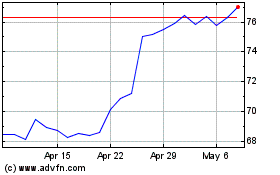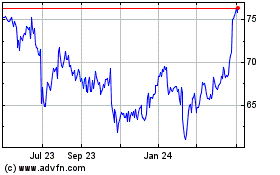First Breakthrough Therapy Designation for
AstraZeneca and Daiichi Sankyo’s datopotamab
deruxtecan
Based on TROPION-Lung05 Phase II trial and
supported by data from TROPION-Lung01 Phase III
trial
Datopotamab deruxtecan (Dato-DXd) has been granted Breakthrough
Therapy Designation (BTD) in the US for the treatment of adult
patients with locally advanced or metastatic epidermal growth
factor receptor-mutated (EGFRm) non-small cell lung cancer (NSCLC)
with disease progression on or after treatment with an
EGFR-tyrosine kinase inhibitor (TKI) and platinum-based
chemotherapy.
The US Food and Drug Administration (FDA) BTD is designed to
accelerate the development and regulatory review of potential new
medicines that are intended to treat serious conditions and address
significant unmet medical needs. The medicine needs to have shown
encouraging preliminary clinical results that demonstrate
substantial improvement on a clinically significant endpoint over
available medicines.
The FDA granted this BTD based on data from the TROPION-Lung05
Phase II trial with supporting data from the TROPION-Lung01 Phase
III trial. Results from a pooled analysis of patients with
previously treated EGFRm NSCLC in these studies were presented this
month at the European Society of Medical Oncology (ESMO) Asia 2024
Congress. This is the first BTD for datopotamab deruxtecan.
Susan Galbraith, Executive Vice President, Oncology R&D,
AstraZeneca, said: “This Breakthrough Therapy Designation
reinforces datopotamab deruxtecan as a promising potential therapy
for patients with EGFR-mutated lung cancer who continue to face
significant unmet needs following disease progression on or after
initial treatments. We are proud to have long supported patients
with EGFR-mutated lung cancer and look forward to the possibility
of bringing another innovative treatment option to this
community.”
Ken Takeshita, MD, Global Head, R&D, Daiichi Sankyo, said:
“The Breakthrough Therapy Designation granted by the FDA
underscores the significant unmet need for new treatments for
patients with previously treated EGFR-mutated non-small cell lung
cancer who have experienced disease progression. Datopotamab
deruxtecan has the potential to play an important role in improving
outcomes and we look forward to working closely with the FDA to
bring this medicine to patients as quickly as possible.”
Datopotamab deruxtecan is a specifically engineered
TROP2-directed DXd antibody drug conjugate (ADC) discovered by
Daiichi Sankyo and being jointly developed by AstraZeneca and
Daiichi Sankyo.
AstraZeneca and Daiichi Sankyo recently announced the submission
of a new Biologics License Application for accelerated approval in
the US for datopotamab deruxtecan for the treatment of adult
patients with locally advanced or metastatic EGFRm NSCLC who have
received prior systemic therapies, including an EGFR-directed
therapy.
Notes
Advanced non-small cell lung cancer
Nearly 2.5 million lung cancer cases were diagnosed globally in
2022.1 Lung cancer is broadly split into small or non-small cell
lung cancer, the latter accounting for about 80% of cases.2
Approximately 10 to 15% of patients with NSCLC in the US and
Europe, and 30 to 40% of patients in Asia have an EGFR mutation.3,4
The majority of EGFR mutations occur in tumors of nonsquamous
histology.5
For patients with tumors that have an EGFR mutation, the
established 1st-line treatment in the metastatic setting is an
EGFR-TKI.6 While EGFR-TKIs have improved outcomes in the 1st-line
setting, most patients eventually experience disease progression
and receive subsequent therapies, such as chemotherapy.7-10
TROP2 is a protein broadly expressed in the majority of NSCLC
tumors.11 There is currently no TROP2-directed ADC approved for the
treatment of lung cancer.6,12
TROPION-Lung05
TROPION-Lung05 is a global, multicenter, single-arm, open-label
Phase II trial evaluating the efficacy and safety of datopotamab
deruxtecan in patients with locally advanced or metastatic NSCLC
with actionable genomic alterations who have progressed on at least
one TKI (with or without other systemic therapies) and on or after
one regimen of platinum-based chemotherapy. Patients receiving up
to four prior lines of treatment with tumors with one or more
genomic alterations including EGFR, ALK, ROS1, NTRK, BRAF, RET or
MET were eligible for the trial.
The primary trial endpoint is objective response rate (ORR) as
assessed by blinded independent central review (BICR). Secondary
efficacy endpoints include duration of response (DoR), disease
control rate (DCR), clinical benefit rate, progression-free
survival (PFS), time to response (TTR), overall survival (OS) and
safety.
TROPION-Lung05 enrolled 137 patients globally in Asia, Europe
and North America. For more information visit
ClinicalTrials.gov.
TROPION-Lung01
TROPION-Lung01 is a global, randomized, multicenter, open-label
Phase III trial evaluating the efficacy and safety of datopotamab
deruxtecan versus docetaxel in adult patients with locally advanced
or metastatic NSCLC with and without actionable genomic alterations
who require systemic therapy following prior treatment. Patients
with actionable genomic alterations were previously treated with an
approved targeted therapy and platinum-based chemotherapy. Patients
without known actionable genomic alterations were previously
treated, concurrently or sequentially, with platinum-based
chemotherapy and a PD-1 or PD-L1 inhibitor.
The dual primary endpoints of TROPION-Lung01 are PFS as assessed
by BICR and OS. Key secondary endpoints include
investigator-assessed PFS, ORR, DoR, TTR, and DCR as assessed by
both BICR and investigator, and safety.
TROPION-Lung01 enrolled approximately 600 patients in Asia,
Europe, North America, Oceania and South America. For more
information visit ClinicalTrials.gov.
Primary PFS results and interim OS results from TROPION-Lung01
were presented at the ESMO 2023 Congress. Final OS results were
presented at IASLC 2024 World Conference on Lung Cancer hosted by
the International Association for the Study of Lung Cancer and
simultaneously published in the Journal of Clinical Oncology in
September 2024.
Datopotamab deruxtecan (Dato-DXd)
Datopotamab deruxtecan (Dato-DXd) is an investigational
TROP2-directed ADC. Designed using Daiichi Sankyo’s proprietary DXd
ADC Technology, datopotamab deruxtecan is one of six DXd ADCs in
the oncology pipeline of Daiichi Sankyo, and one of the most
advanced programs in AstraZeneca’s ADC scientific platform.
Datopotamab deruxtecan is comprised of a humanized anti-TROP2 IgG1
monoclonal antibody, developed in collaboration with Sapporo
Medical University, attached to a number of topoisomerase I
inhibitor payloads (an exatecan derivative, DXd) via
tetrapeptide-based cleavable linkers.
A comprehensive global clinical development program is underway
with more than 20 trials evaluating the efficacy and safety of
datopotamab deruxtecan across multiple cancers, including NSCLC,
triple-negative breast cancer and HR-positive, HER2-low or negative
breast cancer. The program includes seven Phase III trials in lung
cancer and five Phase III trials in breast cancer evaluating
datopotamab deruxtecan as a monotherapy and in combination with
other anticancer treatments in various settings.
Daiichi Sankyo collaboration
AstraZeneca and Daiichi Sankyo entered into a global
collaboration to jointly develop and commercialize fam-trastuzumab
deruxtecan-nxki in March 2019 and datopotamab deruxtecan in July
2020, except in Japan where Daiichi Sankyo maintains exclusive
rights for each ADC. Daiichi Sankyo is responsible for the
manufacturing and supply of fam-trastuzumab deruxtecan-nxki and
datopotamab deruxtecan.
AstraZeneca in lung cancer
AstraZeneca is working to bring patients with lung cancer
closer to cure through the detection and treatment of early-stage
disease, while also pushing the boundaries of science to improve
outcomes in the resistant and advanced settings. By defining new
therapeutic targets and investigating innovative approaches, the
Company aims to match medicines to the patients who can benefit
most.
The Company’s comprehensive portfolio includes leading lung
cancer medicines and the next wave of innovations, including
osimertinib and gefitinib; durvalumab and tremelimumab;
fam-trastuzumab deruxtecan-nxki and datopotamab deruxtecan in
collaboration with Daiichi Sankyo; savolitinib in collaboration
with HUTCHMED; as well as a pipeline of potential new medicines and
combinations across diverse mechanisms of action.
AstraZeneca is a founding member of the Lung Ambition Alliance,
a global coalition working to accelerate innovation and deliver
meaningful improvements for people with lung cancer, including and
beyond treatment.
AstraZeneca in oncology
AstraZeneca is leading a revolution in oncology with the
ambition to provide cures for cancer in every form, following the
science to understand cancer and all its complexities to discover,
develop and deliver life-changing medicines to patients.
The Company’s focus is on some of the most challenging cancers.
It is through persistent innovation that AstraZeneca has built one
of the most diverse portfolios and pipelines in the industry, with
the potential to catalyze changes in the practice of medicine and
transform the patient experience.
AstraZeneca has the vision to redefine cancer care and, one day,
eliminate cancer as a cause of death.
About AstraZeneca
AstraZeneca is a global, science-led biopharmaceutical company
that focuses on the discovery, development and commercialization of
prescription medicines in Oncology, Rare Diseases and
BioPharmaceuticals, including Cardiovascular, Renal &
Metabolism, and Respiratory & Immunology. Based in Cambridge,
UK, AstraZeneca operates in over 125 countries, and its innovative
medicines are used by millions of patients worldwide. For more
information, please visit www.astrazeneca-us.com and follow us on
social media @AstraZeneca.
References
- World Health Organization. Global Cancer Observatory: Lung.
Available at:
https://gco.iarc.who.int/media/globocan/factsheets/cancers/15-trachea-bronchus-and-lung-fact-sheet.pdf.
Accessed December 2024.
- American Cancer Society. Key Statistics for Lung Cancer.
Available at:
https://www.cancer.org/cancer/types/lung-cancer/about/key-statistics.html#:~:text=NSCLC%20is%20the%20most%20common,be%20diagnosed%20with%20lung%20cancer.
Accessed December 2024.
- Szumera-Ciećkiewicz A, et al. EGFR Mutation Testing on
Cytological and Historical Samples in Non-Small Cell Lung Cancer: a
Polish, Single Institution Study and Systematic Review of European
Incidence. Int J Clin Exp Pathol. 2013;6(12): 2800-2812.
- Ellison G, et al. EGFR Mutation Testing in Lung Cancer: a
Review of Available Methods and Their Use for Analysis of Tumour
Tissue and Cytology Samples. J Clin Pathol. 2013;66(2):79-89.
- Prabhakar C. Translational Lung Cancer Research. 2015; 4(2),
110-118.
- American Cancer Society. Targeted Drug Therapy for Non-Small
Cell Lung Cancer. Available at:
https://www.cancer.org/cancer/types/lung-cancer/treating-non-small-cell/targeted-therapies.html.
Accessed December 2024.
- Chen R, et al. Emerging therapeutic agents for advanced
non-small cell lung cancer. J Hematol Oncol. 2020:13(1):58.
- Majeed U, et al. Targeted therapy in advanced non-small cell
lung cancer: current advances and future trends. J Hematol Oncol.
2021;14(1):108.
- Morgillo F, et al. ESMO Open. 2016;1:e000060. Available at:
https://pmc.ncbi.nlm.nih.gov/articles/PMC5070275/. Accessed
December 2024.
- Han B, et al. Onco Targets Ther. 2018;11:2121-9. Available at:
https://www.dovepress.com/efficacy-of-pemetrexed-based-regimens-in-advanced-non-small-cell-lung--peer-reviewed-fulltext-article-OTT.
Accessed December 2024.
- Mito R, et al. Clinical impact of TROP2 in non-small cell lung
cancers and its correlation with abnormal p53 nuclear accumulation.
Pathol Int. 2020;70(5):287-294.
- Rodríguez-Abreau D, et al. Pemetrexed plus platinum with or
without pembrolizumab in patients with previously untreated
metastatic nonsquamous NSCLC: protocol-specified final analysis
from KEYNOTE-189. Ann Onc. 2021 Jul;32(7): 881-895.
US-96427 Last Updated 12/24
View source
version on businesswire.com: https://www.businesswire.com/news/home/20241209094703/en/
Media Inquiries Brendan McEvoy +1 302 885 2677 Chelsea
Tressler +1 302 885 2677
US Media Mailbox: usmediateam@astrazeneca.com
AstraZeneca (NASDAQ:AZN)
Historical Stock Chart
From Dec 2024 to Jan 2025

AstraZeneca (NASDAQ:AZN)
Historical Stock Chart
From Jan 2024 to Jan 2025
